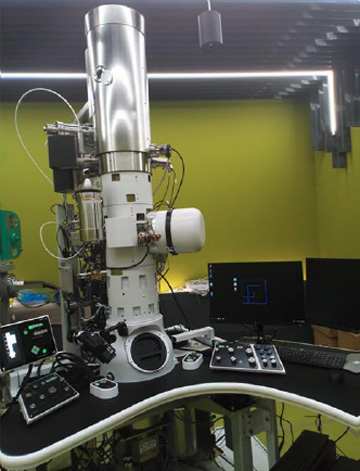Director’s Introduction – 2020

Dear Colleagues,
On the New Year’s Day, 32 months elapsed from my entering the position of Director of the Institute of Molecular Genetics. My main objective in 2019, similarly as in previous years, was to ensure operation of the Institute within the limits of a public research institution, secure funding for our activities, and contribute to managing the funds that we have obtained and are obtaining in accordance with all the regulations, to finally transform them into significant novel findings in the areas of our research.
Scientific research continued in this period in 28 research groups (21 in Krč, 6 in Vestec within the framework of project BIOCEV, and one in Dejvice) and in four large national infrastructures (three in Krč, Czech-BioImaging, CZ-OPENSCREEN, and ELIXIR CZ, and one in Vestec, Czech Centre for Phenogenomics). At present, our Institute counts 607 employees (536 full time equivalnts, FTE). About two thirds of them work in Krč, and about a third contribute to project BIOCEV at the detached site in Vestec; a minor part of employees works in Dejvice and at the Koleč farm. The Institute comprises 366 research scientists (320 FTE), including 121 PhD students (112 FTE).
The results of our research in this period were presented at international conferences and symposia, including those organized by IMG researchers, and were published in a number of important international journals. The activity of the research groups also resulted in application outputs and patents, which in many cases reflected cooperation with the business sphere and contributed considerable financial means to our Institute budget. To facilitate implementation of the application results, the Institute reinforced the technology transfer office (TTO) and continued cooperation with the i&i company. The applied research at IMG should also be supported by the new TACR gamma 2 project for 2020-2022.
At present, we obtain the major part (~60%) of funding that sustains our basic research tasks in the form of specific funding from grant agencies and other funding providers. It is therefore not surprising that currently we work on 118 grants and projects from various providers, including the Czech Science Foundation (53 projects), Czech Academy of Sciences (13), Ministry of Education (22), EU (11), Ministry of Health (8), and others. This means that on average, each group and infrastructure participates in more than four projects. To improve conditions for preparing grant applications and getting information on possible grant funding, our Grant Department again systematically monitored sources of specific funding, informed our researchers in Grant News, and helped them to draft grant applications and manage grant inspections. For 2020, we plan assessment of all research scientists, and we await evaluation of the Institute organized by the Government R&D Council (M17+ methodology) and the Academy (down to the level of research groups).
In 2020, project BIOCEV, of which our Institute is guarantor, enters its fifth and at the same time last year of the compulsory sustainability phase. Similarly as in the four previous years, we will ensure fulfilment of the set indicators and aim to obtain finances for covering the operational costs. I expect fulfilment of the sustainability indicators without problems. Concerning provision of operational costs, the situation is more difficult, because the budget for the detached site in Vestec is not provided to the Institute by the founder within the “classical” institutional Academy funding (“RVO”, development of research organizations), but the Institute must apply for this funding in a specific Academy competition. Receiving the operational costs based on this application is not certain, similarly as their final amount and the date of their obtaining. This situation greatly complicated drafting the budget in the year 2018 and particularly in the last year, and reduction of the funding had a negative effect on the results of IMG financial management in the last two years. At the beginning of 2020, we find ourselves in a similar position, not knowing the amount of funding for BIOCEV, but expecting another reduction of the requested finances.
The future of the project BIOCEV operation is also intensively discussed at the level of Academic Council and statutory representatives of partner organizations (six Academy Institutes and two Faculties of Charles University). To continue the current project arrangement of the BIOCEV Centre seems to be the preferred variant, ensuring efficient exploitation of all the newly established structures and infrastructures of project BIOCEV, with maintaining the present positions of partner organizations according to the Partner Contract, and with the Institute of Biotechnology residing in Vestec and other partners from the Academy and Charles University having there their detached sites. In relation to this concept and in an endeavour to increase the mutual awareness of both topically and spatially close workplaces in Krč and Vestec, regular BIOCEV-Krč methodology seminars were organized and should also continue in 2020.
Of essential importance for operation of the entire Institute are IMG administrative and technical services in Krč and in BIOCEV. Since 2019, closer cooperation and more effective and conceptual management of these administrative and technical departments in both localities have become the responsibility of Martin Polák, Deputy Director for administrative matters of BIOCEV and IMG. In 2020, mainly thanks to the excellent work of the Economy Department and the Department of Public Tenders, the Institute will switch to a new economic information system, which should have its “hot start” on January 1st, 2021. We can only wish this start to occur without problems. The activity of our administrative management, the exemplary cooperation with the General Control Division of the Academy Head Office, and the understanding from the side of Institute researchers residing in the guesthouse resulted in an important result, resolution of the dispute about the guesthouse with its owner and purchase of the guesthouse into our ownership. The other tasks of the administrative and technical management, including Economy Department, Building Administration, IT Department, and Administrative Team, were also resolved at the requested level.
 The building activities in the elapsed period consisted in repairs in the Krč animal facility, renovation of the key buildings in the detached site in Koleč, and namely extensive renovation of the electron microscopy facility in the main building in Krč associated with installation of new electron microscopes (JEM F200 F2 and JEM 1400 FLASH), with completion of the laboratories and other spaces in the Czech-BioImaging infrastructure. In 2020, the renovation in Koleč and the adaptations in Krč and in Vestec will continue by equipment of all our three national infrastructures with new instruments.
The building activities in the elapsed period consisted in repairs in the Krč animal facility, renovation of the key buildings in the detached site in Koleč, and namely extensive renovation of the electron microscopy facility in the main building in Krč associated with installation of new electron microscopes (JEM F200 F2 and JEM 1400 FLASH), with completion of the laboratories and other spaces in the Czech-BioImaging infrastructure. In 2020, the renovation in Koleč and the adaptations in Krč and in Vestec will continue by equipment of all our three national infrastructures with new instruments.
We multiply our efforts in the popularization of our results and activities. Gradually, we improve our website with the aim to have all texts both in Czech and in English. In addition, a new PhD administrator has been engaged in helping the PhD Committee to ensure the PhD programme, not only at the level of the Institute, but also of the entire Krč campus. Promotion of the Institute was also a focus of the IMG Open Doors Day, with active participation in the Week of Science and Technology of the Academy 2019, and launching the IMG Instagram, Twitter and Facebook.
A number of additional Institute activities have been recorded in the minutes of IMG Council, which are accessible at the Institute Intranet. The Intranet also contains the new Working Rules that came into effect on September 2019, and several directives reflecting the comments of controlling organs on the management and operation of our workplaces.
Finally, I would like to thank you all at the Institute, in research as well as service, administrative, and animal-care departments, for your expended work, and I am looking forward to further cooperation and novel discoveries coming from our reserach groups in 2020.
January 2nd, 2020
Petr Dráber
Last change: January 6, 2020







